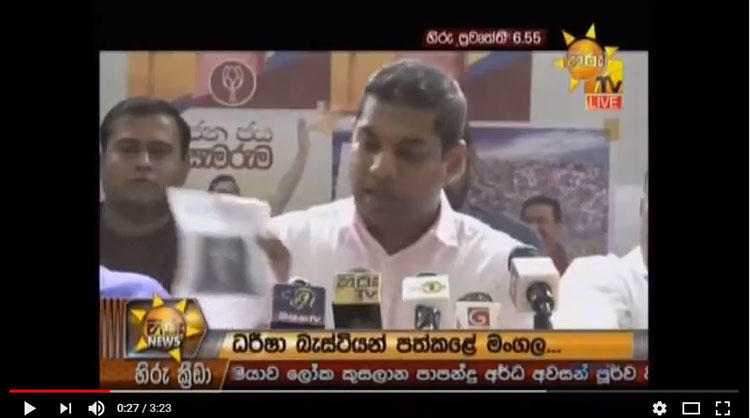Washington, D.C., July 3, 2018–The Committee to Protect Journalists today called on opposition politicians in Sri Lanka to stop trying to intimidate local journalists by publicly leveling accusations against them. At a press conference yesterday evening, associates of former President Mahinda Rajapaksa accused two journalists for The New York Times of being tools of the current government, the Times reported.
Rajapaksa on July 1 issued a statement disputing the findings of a June 25 Times investigative report alleging, among other points, that Chinese funds had flowed into Rajapaksa’s failed 2015 presidential campaign. The Times‘ New Delhi-based South Asia correspondent, Maria Abi-Habib, penned the article with contributions from Sri Lanka journalists Dharisha Bastians and Arthur Wamanan.
Members of parliament, including Kanchana Wijesekera and Dullas Alahapperuma, at yesterday’s press conference accused Bastians and Wamanan of being tools of the current government, according to transcripts of the press conference published by GroundViews, a news website in Sri Lanka. One of the politicians showed a photo of Bastians to the camera, the Times said.
“Politicians have every right to dispute the findings of a news report, but publicly singling out Dharisha Bastians and Arthur Wamanan is a worrisome development in a country noted for attacks on journalists and unsolved journalist murders,” said Steven Butler, CPJ’s Asia program coordinator. “We call on all political parties in Sri Lanka to publicly affirm support for press freedom and journalists’ safety.”
During Rajapaksa’s decade in office from 2005 to 2015, 11 journalists were killed, including five who were targeted for murder and whose cases remain unsolved, according to CPJ research. Rajapaksa’s Sri Lanka Podujana Peramuna party won heavily in local elections in February, according to news reports.
While Sri Lanka’s current government has promised to take swift action to solve journalist murders, progress has been painstakingly slow, according to CPJ research. Police have complained that evidence in the murders was lost or destroyed under the previous government, creating obstacles to prosecution.
In a statement today, New York Times international editor Michael Slackman stood by the story while saying the politicians’ action “appears intended to silence critics and curb press freedoms and ultimately deprive Sri Lankans of information in the public interest.”
